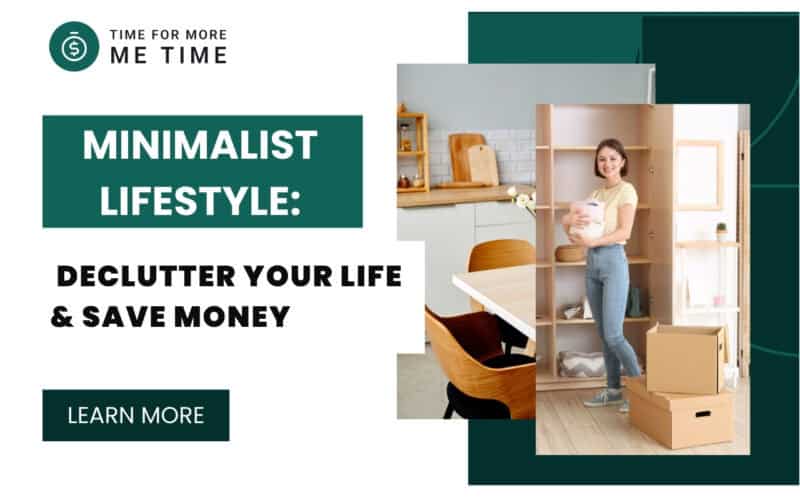Are you feeling overwhelmed by clutter and financial stress? Embracing a minimalist lifestyle can be the transformative solution you’ve been searching for.
With over a decade of experience in simplifying my own life and finances, I’ve discovered how a minimalist lifestyle clears physical space. But most importantly, it also creates mental clarity and significant savings.
In this blog, I’ll share practical and some frugal living tips on how adopting a minimalist lifestyle can help you declutter your life while boosting your budget. Keep reading to discover a path to a simpler, more fulfilling life!
Understanding Minimalism
Minimalism is about living intentionally—not about deprivation. You can even mix it with frugal lifestyle ideas, and you can easily find your money grow fast.
Instead, it’s deciding what truly adds value to your life and letting go of the rest. This often means decluttering your physical space, but it goes beyond your closet.
It involves changing your minimalist mindset.
Core Principles: Simplicity, Intentionality, and Decluttering
Minimalist living encourages you to evaluate your possessions, commitments, and even your thoughts to see how they impact your happiness and stress levels. Simplifying your life by reducing mental clutter and buying less is key.
Intentionality means understanding the purpose behind each purchase, action, and commitment. This also applies to the things you own—consider letting go of items that no longer serve a purpose, making room for what truly adds value to your life.
However, decluttering goes beyond the physical space.
It also involves trimming unnecessary obligations—or things, giving you more breathing room and helping you embrace a simpler life.
Common Misconceptions about Minimalist Lifestyle
Many people assume minimalism demands a strict, rigid lifestyle, but that’s not the case.
Embracing a minimalist lifestyle is about keeping what truly matters to you. For instance, a minimalist or capsule wardrobe can reduce decision fatigue, while a digital detox can clear mental clutter.
Minimalism looks different for everyone; it’s not about owning less than others but rather owning less than you used to, creating a positive impact in your life.
Starting small—like with a simplified wardrobe or mindful credit card use—can help you gradually expand minimalism throughout your entire home.
How Minimalism Affects Spending Habits
Minimalism isn’t just about owning less; it’s a thoughtful approach that naturally encourages smarter spending.
With years of experience in mindful budgeting, I’ve seen firsthand how minimalist principles can transform financial habits for success. When you focus on what truly matters, financial savings often come effortlessly because spending becomes more intentional.
Although change can feel overwhelming initially, simple habits like journaling your progress or keeping minimalist to-do lists help ease the transition and reveal new insights into your habits.
Reducing Temptation to Buy
A minimalist lifestyle redirects your focus from impulsive purchases to lasting values. The result? You’re reducing your urge to buy unnecessary items.
These days, our culture often encourages constant consumption. But by centering on what you genuinely value, you reduce the mental and financial clutter that doesn’t serve you.
Impulse buys, often driven by stress or boredom, lose their appeal when you realize that possessions don’t bring lasting joy.
Consider this: do you feel more satisfaction from a fleeting online purchase or from completing a meaningful project that aligns with your goals?
I often reflect on these moments to help me clarify what enhances my minimalist lifestyle.
For instance, I don’t buy multiple trendy sweaters that may go out of style quickly. I consider investing in one high-quality sweater that I truly love and that will last for years.
This intentional approach not only minimizes clutter in your closet but also enhances my overall satisfaction with my wardrobe.
Ultimately, embracing a minimalist wardrobe means opting for fewer but better purchases, which lies at the heart of minimalist living.
Focusing on Quality Over Quantity
Choosing quality over quantity is another cornerstone of minimalism. For me, it’s about prioritizing durable items over trends bringing long-term savings.
Leading minimalism experts, like Joshua Becker of Becoming Minimalist, agreed that owning fewer, high-quality items leads to a more fulfilling life.
Again, having a minimalist lifestyle isn’t about deprivation—it’s about finding joy and purpose in what you own. Investing in a well-made item not only provides satisfaction with each use but also reduces the need for frequent replacements.
That means enhancing your commitment to a sustainable and financially responsible lifestyle.
To do that, before buying, think carefully about whether each purchase genuinely adds value to your life.
Financial Benefits of the Minimalist Lifestyle
Adopting a minimalist lifestyle goes beyond decluttering—it’s a powerful approach to financial freedom.
By focusing on what truly matters and cutting out unnecessary expenses, a minimalist lifestyle can lead to substantial savings and a more intentional approach to money. Here’s how minimalism can positively impact your finances.
Earning Extra Money by Decluttering Unused Items
When you start decluttering, you may find unused items like old electronics, clothes, or kitchen gadgets. Selling these items on platforms like eBay, Facebook Marketplace, or local consignment shops can turn “clutter” into cash.
The result? You can use it as extra income that can help with monthly bills or fund a meaningful purchase like a family outing or a donation to a cause you care about.
Reducing Living Expenses
Adopting a minimalist lifestyle often leads to downsizing. For example, moving from a three-bedroom house to a two-bedroom apartment could reduce monthly rent or mortgage payments and cut utility costs by up to 30%.
With today’s high cost of living, these savings matter more than ever.
Smaller living spaces are also quicker to clean and furnish, saving both time and money. Many minimalists opt for basic, high-quality furniture over luxury pieces, which keep costs down and support a simpler lifestyle.
Planning Cost-effective Meals
Meal planning aligns with minimalist principles by promoting simplicity and intentionality. With meal planning, you’re focusing on:
- Staple ingredients.
- Buying only what you need.
- Minimizing waste.
As a domino effect, you can save money, reduce clutter in the kitchen, and enjoy a more sustainable lifestyle.
Simplifying your meals can save hundreds each month. Marisa Hillman said in Reader’s Digest that she saves $500 a month because of weekly meal plans.
And that’s no wonder because preparing a weekly grocery list focused on essentials you use frequently reduces impulsive purchases.
For example, planning meals around affordable staples like rice, beans, vegetables, and proteins can help keep grocery bills low.
Additionally, mindful meal prep helps prevent food waste.
You can use leftover veggies in a soup or pasta dish, for instance, fostering gratitude for each meal while promoting both physical and mental well-being.
Mindful Consumption and Its Impact on Savings
Practicing mindful consumption means consciously choosing what we buy and understanding its impact on our lives and finances. This approach helps us prioritize meaningful purchases, ultimately resulting in reduced spending and enhanced savings.
Budgeting and Financial Planning
Adopting a minimalist lifestyle can transform how we approach budgeting and financial planning.
Tracking your expenses reveals patterns of mindless spending:
- Frequent coffee shop visits.
- Impulse buys at the grocery store.
All of which can significantly drain your finances. By identifying these areas, you can redirect your money toward savings or meaningful experiences.
For instance, remember that $500 that Marisa saved on meal planning? Why not use it for a weekend getaway or save it in a high-yield savings account or other sources of passive income?
Minimalist financial practices create a harmonious balance among earning, saving, spending, and investing. They encourage you to live simply by buying less and focusing on experiences rather than material possessions.
For instance, rather than splurging on the latest gadgets, you might choose to save that money for a family trip or invest in a hobby you’re passionate about.
What do you get from it? This shift allows you to prioritize quality time over quantity, ultimately guiding you toward a more intentional and fulfilling life.
Incorporating simple activities like practicing gratitude and journaling into your daily habits, as well as engaging in digital detoxes and maintaining to-do lists, can reinforce this lifestyle.
After all, you deserve a life enriched by experiences and meaningful connections rather than a cluttered space filled with items that don’t bring you joy.
FAQs
What is the lifestyle of a minimalist?
A minimalist lifestyle is about living with intention. It focuses on keeping only what adds value to your life and removing clutter. Minimalism helps declutter your life so you can have more meaningful interactions.
What is the 30-day rule in minimalism?
The 30-day rule in minimalism is a practical guideline designed to help individuals evaluate their purchases and reduce impulsive spending.
The principle is simple: before buying a non-essential item, commit to waiting for 30 days. During this period, you should consider whether the item is truly necessary and if it aligns with your values and goals.
This approach encourages mindfulness around consumption by providing time to reflect on the potential purchase’s value in your life. Say you find yourself wanting the latest gadget or a trendy piece of clothing.
Write it down and wait 30 days before making the decision to buy.
By the end of that month, many people find that the initial excitement has faded. And the best is that they may realize they can live without the item altogether.
Additionally, this rule helps combat the feelings of instant gratification that often drive impulse purchases. It shifts your focus from short-lived desires to more meaningful and intentional consumption.
Again, doing so supports the minimalist lifestyle by prioritizing quality over quantity in your belongings.
Are minimalists happier?
Research suggests a link between life satisfaction and happiness. Minimalists often report greater happiness. That may be because they pursue what has personal value, whether it’s quality goods or experiences.
Consider how saving money by having less can provide more opportunity. Minimalism isn’t inherently good, but when implemented in life, it forces intentionality and focuses improvement through a greater understanding of your values.
Why is minimalism a better way of life?
Minimalism might not be the best choice for everyone, but it offers a useful way to focus on what really matters to you. It makes you think about what is important in your life and helps you appreciate the things you own.
By reducing clutter, you can avoid feeling overwhelmed and create a calmer space.
Also, minimalism saves you time by cutting down on chores that come with owning a lot of stuff. This extra time allows you to spend more quality moments with friends and family.
You can also look into ideas from Zen Habits that work well with minimalist living and help you enjoy a simpler, more meaningful life.
Conclusion
Adopting a minimalist lifestyle can transform your life into a simpler, more intentional journey focused on quality over quantity.
By understanding its core principles and clearing up common misconceptions, you can effectively improve your financial condition. Minimalism promotes mindful spending habits, enabling you to save money and enjoy more meaningful experiences.
Through decluttering, budgeting, and intentional consumption, you can reap the benefits of minimalism for your financial health and overall well-being.
Ready to start your minimalist journey? Begin today by reflecting on what truly matters to you and creating space for those things in your life!
Subscribe to my YouTube channel and watch my vlogs to join a community dedicated to achieving financial freedom!






